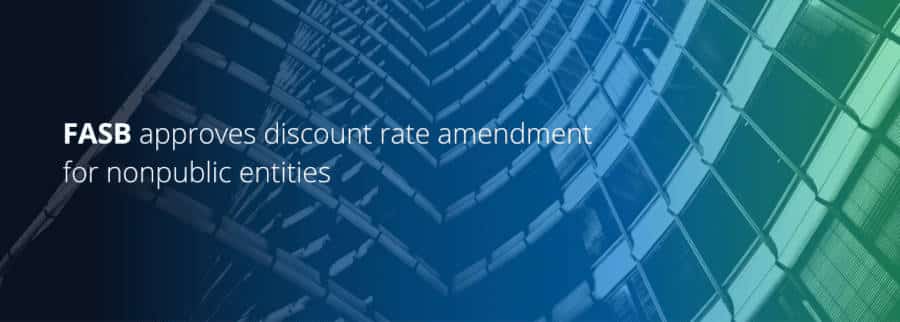BLOGS
FASB approves discount rate amendment for nonpublic entities

On Wednesday, September 15, 2021, the Financial Accounting Standards Board (FASB or Board) approved an amendment on the proposed Accounting Standards Update, that provides nonpublic organizations with additional flexibility in how they determine the discount rate they use when classifying their leases.
The relief granted by the Board is intended to make it easier and more cost-effective for organizations to implement the new ASC 842 standards, which take effect for private organizations and certain not-for-profit entities at the end of this year.
Prior to the change, organizations had to opt for one type of rate and apply it to all their leases at an entity-wide level. But this change provides nonpublic organizations with a practical expedient that permits them to make an optional accounting policy election, to use the risk-free discount rate by class of underlying asset (rather than the more difficult to derive incremental borrowing rate). Meaning lessees can now choose one rate for a particular asset class such as equipment, and a different rate for another class such as real estate.
Lessees that make the election are required to disclose which asset class or classes it has chosen to apply the risk-free rate. The amendment will also require a lessee to use the rate implicit in the lease when it is readily determinable, regardless of whether the lessee makes the risk-free rate election.
Public companies are not permitted to use the risk-free rate, as FASB argues that they are likely to possess greater resources and funds to calculate the incremental borrowing rate (IBR).
ASC 842 defines the IBR as: “the rate of interest that a lessee would have to pay to borrow on a collateralized basis over a similar term an amount equal to the lease payments in a similar economic environment.”
Transition and effective date
The rule change is set to take effect for nonpublic companies for annual periods beginning after 15, December 2021, including interim reporting periods beginning after 15, December 2022, with early application permitted.
Under the approved amendment, for nonpublic entities that have not adopted ASC 842 as of the issuance date, the Board decided that the transition and effective date provisions in paragraph 842-10-65-1 should apply.
For nonpublic business entities that have adopted ASC 842 as of the issuance date of any final guidance, the Board decided to require the use of a modified retrospective transition method.
A full list of the Board decisions can be found here.
To find out how IRIS’ lease accounting software can help address the multiple changes to ASC 842 and fast-track your lease accounting compliance project, request a free personalized demo today.










